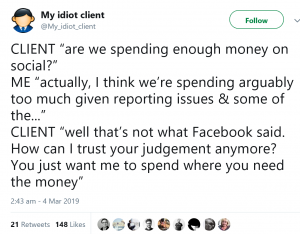What Are Agencies For?
14 March 2019
Media agencies are facing a major challenge – from media vendors going direct, and from their clients setting up in-house operations. And that’s to name but two. It’s a good time to ask what exactly are agencies for?
‘Media independents’ (as they were known) came into existence in the first place because the full-service agencies didn’t pay enough attention to the media function.
To begin with the debate was all about saving money – lower overheads combined with a reduction in creative agency commission greater than the amount paid to the media agency meant lower fees.
A focus on doing one thing well led to lower media costs.
Lower media costs plus lower service fees equals a good deal for advertisers.
At the time there was a discussion around whether media planning should stay with the creative agency; leaving the new media independents to focus on buying. The question was whether splitting planning from creative was worse than splitting planning from buying?
Most clients went for the pragmatic over the conceptual. Most full-service agencies got rid of their media people. And so the prehistoric version of the modern media agency was born.
The buying benefit was easy to explain. We save you money was the gist of it. Quantifying the planning benefit was harder, so for years agencies charged on the basis of their buys, and in effect delivered planning for free.
Have we moved on?
When the Cog Blog started in 2013 one of the first comments was from an agency CEO saying that clients wouldn’t pay for planning. After nearly 40 years agencies still hadn’t managed to find a way to charge for planning.
It’s a little like the market research agencies making their money on doing fieldwork, not on interpreting the results. It was easier to sell on the basis of so-much per interview than to charge for thinking. Once fieldwork costs fell as online came along that model made no sense at all.
Media agencies are full of smart planners, smart researchers, and smart strategists. These guys haven’t just arrived, and yet historically the business model was not based on their skills but on buying.
But buying is no longer the key pillar in the model. FB et al deal direct with clients. Clients are setting up in-house units. And last week UK broadcasters said that they were collaborating in selling their medium to advertisers direct.
Agencies’ buying clout, and their old-fashioned threats of withholding favours from those daring to go direct doesn’t work with the likes of Facebook, and it’s hard to talk of clout given the transparency debate.
The best agencies contain curious, creative, restless people. People who can find left-field, original solutions to problems, whether those solutions exist within a media or a creative (or indeed a PR, experiential or sponsorship) context.
The best are great (as they’ve always been) at collaborating with all kinds of experts, from data scientists to researchers, from media vendors to production companies to find and then execute brilliant ideas.
They can weigh up any number of options and choose combinations of tactics to meet a strategic need.
Clients need these skills more than ever. Agencies can convince them, right?
There’s a Twitter account, My Idiot Client where frustrated agencies can share what they consider to be idiotic remarks made by their clients.

This much commented-upon lack of trust is in large part a problem of the agencies’ own making, caused by a mistaken (and lazy) belief that clients only want cheap rubbish, a lack of interest (outside of conference speeches) in spending behind what works, and a focus on deals.
Yes, they’ve been helped by many bad players, and yes clients haven’t historically got as close to these issues as they are now, but agencies have always existed to lead client thinking, to advise, to guide.
If agencies don’t start selling their expertise as business problem solvers and get their buyers to buy what’s planned they won’t have a future. Agencies have to be an upstream partner, not a down-stream supplier.
The good news is that the penny is dropping. But if it doesn’t drop fast enough, and agencies are by-passed by others (including their clients) one might reasonably ask: who’s the idiot?
